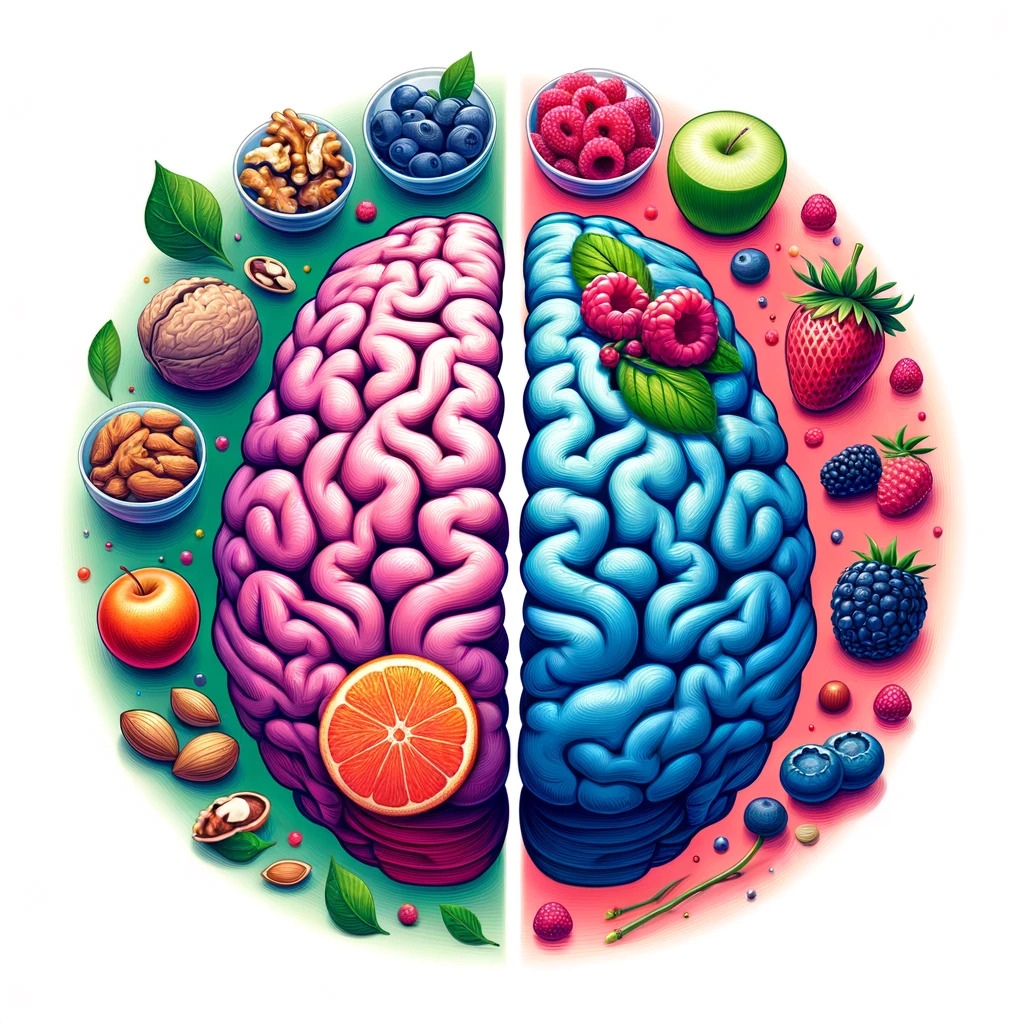Introduction to the MIND Diet and Its Importance for Brain Health
Discover the MIND diet, a blend of Mediterranean and DASH diets, aimed at improving brain health and preventing neurodegenerative diseases. Emphasizing leafy greens, nuts, berries, and fish, it offers a balanced approach to enhance cognitive function and overall well-being.

The MIND diet, a hybrid of the Mediterranean and DASH diets, is gaining recognition for its potential in promoting brain health and reducing the risk of Alzheimer's disease. Developed by nutritional epidemiologists at Rush University Medical Center, the MIND diet stands for Mediterranean-DASH Intervention for Neurodegenerative Delay. It focuses on food groups known to benefit brain function and overall cognitive health.
Understanding the MIND Diet: A Blend of Mediterranean and DASH Diets
The MIND diet combines elements of the Mediterranean diet and the DASH (Dietary Approaches to Stop Hypertension) diet. Both diets have been acclaimed for their health benefits, including lower blood pressure and improved heart health. The MIND diet specifically targets brain health by emphasizing foods that improve cognitive function and reduce the risk of neurodegenerative diseases.
Key Components of the MIND Diet for Brain Health
The diet encourages the consumption of brain-healthy foods such as green leafy vegetables, other vegetables, berries, nuts, olive oil, whole grains, fish, beans, poultry, and wine in moderation. It discourages red meats, butter and margarine, cheese, pastries and sweets, and fried or fast food.
Olive Oil and Brain Cells: The Role of Extra Virgin Olive Oil
Extra virgin olive oil, a staple of the Mediterranean diet, is recommended in the MIND diet due to its potential to protect brain cells. Rich in antioxidants, it helps in reducing oxidative stress, which is linked to cognitive decline.
Leafy Greens and Cognitive Function
Leafy greens like spinach, kale, and collard greens are essential components of the MIND diet. These vegetables are high in vitamin E, beta carotene, and other nutrients that support brain health and may improve cognitive function.
The Significance of Fatty Fish and Omega-3 Fatty Acids
Fatty fish, such as salmon and mackerel, are rich sources of omega-3 fatty acids, known to be beneficial for brain function. Regular consumption of fish is encouraged in the MIND diet for its potential to improve brain health and reduce the risk of cognitive impairment.

The Impact of the MIND Diet on Alzheimer's Disease and Cognitive Decline
Research suggests that closely following the MIND diet can lower the risk of developing Alzheimer's disease and slow cognitive decline. This is particularly significant considering Alzheimer's is the sixth leading cause of death in older adults.
Blood Pressure and Neurodegenerative Delay
The MIND diet not only focuses on brain health but also incorporates dietary approaches to lower blood pressure, thereby addressing a common risk factor for cognitive decline.
How to Implement the MIND Diet in Daily Life
Adopting the MIND diet involves incorporating more plant-based foods, whole grains, and lean proteins, while reducing the intake of saturated fats and trans fats found in fried foods and red meat.
Meal Plans and Healthy Diet Choices
Creating meal plans that include a variety of the recommended food groups makes it easier to adhere to the MIND diet. For example, incorporating salads with mixed greens, olive oil-based dressings, and a moderate amount of nuts and beans can be a simple start.
Detailed Guide to Meal Plans and Healthy Diet Choices for the MIND Diet
Adopting the MIND diet requires thoughtful meal planning to ensure a balanced intake of the recommended food groups. A well-structured meal plan can significantly enhance adherence to this diet, which is crucial for maximizing its brain health benefits.
Key Principles of Meal Planning on the MIND Diet
Diversity of Nutrients: Ensure each meal contains a variety of nutrients that support brain health. This includes incorporating foods rich in omega-3 fatty acids, antioxidants, vitamins, and minerals.
Balance and Moderation: While focusing on brain-healthy foods, it's important to maintain a balanced diet that controls portions, especially for foods consumed in moderation, such as red wine and poultry.

Example of a Daily MIND Diet Meal Plan
Breakfast: Start with a bowl of whole-grain oatmeal topped with a mix of berries (rich in antioxidants) and a handful of nuts (for healthy fats). Add a dash of cinnamon for flavor and extra health benefits.
Lunch: Prepare a salad with mixed greens (including spinach and other leafy vegetables), cherry tomatoes, and slices of avocado. Dress it with extra virgin olive oil and balsamic vinegar, and add grilled chicken or salmon for protein.
Snack: Opt for a small portion of nuts or cut-up veggies with hummus. This not only satisfies hunger but also provides essential nutrients and fiber.
Dinner: Choose a heartier option like a quinoa and black bean bowl, accompanied by steamed broccoli or sautéed collard greens. Use olive oil for cooking to boost healthy fat intake.
Dessert: If desired, enjoy a moderate amount of dark chocolate or a small glass of red wine, both known for their brain health benefits.
Tips for Successful Meal Planning on the MIND Diet
Weekly Planning: Plan your meals for the week. This helps in shopping for the right ingredients and reduces the likelihood of opting for unhealthy choices.
Cook in Bulk: Prepare dishes in larger quantities to save time. Soups, stews, and casseroles are great options and can be refrigerated or frozen for later consumption.
Incorporate Variety: Rotate different types of leafy greens, whole grains, and protein sources to keep meals interesting and nutritionally diverse.
Mindful of Cooking Methods: Opt for healthier cooking methods like grilling, baking, or steaming instead of frying. This helps in reducing the intake of unhealthy fats.
Consult a Registered Dietitian: If you're new to the MIND diet or have specific dietary needs, consulting with a dietitian can provide tailored advice to ensure your meal plans are nutritious and enjoyable.

Embracing the MIND Diet Through Thoughtful Meal Planning
Adhering to the MIND diet through well-planned meals is a proactive step towards improving brain function and reducing the risk of cognitive decline. By focusing on a variety of brain-healthy foods and maintaining a balance in your diet, you can enjoy the full health benefits this diet offers while also indulging in delicious and satisfying meals.
Consultation with Registered Dietitians for Personalized Guidance
For those looking to adopt the MIND diet, consulting with registered dietitians can provide personalized dietary advice, especially for individuals with specific health conditions or family history of neurodegenerative diseases.
Future Research and Developments
While more research is needed to fully understand the impact of the MIND diet on brain health and neurodegenerative diseases, current evidence supports its potential benefits. Researchers continue to explore how specific components of the diet contribute to cognitive health and the prevention of diseases like Alzheimer's.
Conclusion: Embracing the MIND Diet for Improved Cognitive Health
In conclusion, the MIND diet offers a promising approach to improving brain function and reducing the risk of Alzheimer's disease and cognitive decline. By combining elements of the Mediterranean and DASH diets, it provides a balanced, heart-healthy eating plan that also prioritizes brain health. As research progresses, the MIND diet stands as a testament to the power of dietary intervention in preserving cognitive health and well-being.
MIND Diet FAQ Section
Q1: How does the MIND diet improve brain health?
A: The MIND diet combines the Mediterranean and DASH diets, focusing on foods that specifically support brain health. By emphasizing green leafy vegetables, berries, nuts, olive oil, and whole grains, it aims to enhance cognitive function and reduce the risk of neurodegenerative diseases.
Q2: What are the core principles of the Mediterranean-DASH Intervention for Neurodegenerative Delay (MIND) diet?
A: The MIND diet's core principles involve consuming brain-healthy foods while reducing the intake of unhealthy fats and red meat. It encourages eating plant-based foods, lean proteins, and healthy fats to lower the risk of cognitive decline and improve overall brain function.
Q3: What health benefits does the MIND diet offer apart from brain health?
A: Besides improving cognitive function, the MIND diet offers several health benefits, including lower blood pressure levels, reduced risk of heart disease, and potential weight loss. Its balanced approach to nutrition supports overall physical health.
Q4: Can the MIND diet help with weight loss?
A: Yes, the MIND diet can aid in weight loss. Its focus on whole, nutrient-rich foods and limitation of high-calorie and processed foods can contribute to a healthier weight.



